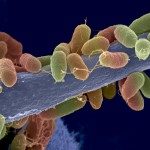Link to Pubmed [PMID] – 16113258
Infect. Immun. 2005 Sep;73(9):5420-5
Aspergillus fumigatus, an opportunistic fungal pathogen, causes severe and usually fatal invasive pulmonary aspergillosis in immunocompromised hosts. Interestingly, Drosophila cells lacking the Toll protein are prone to A. fumigatus infection. In the current study, we looked for the involvement of Toll-like receptor 2 (TLR2) in the recognition of A. fumigatus by analyzing the in vivo and ex vivo responses of immunocompromised TLR2(-/-) and TLR2(+/+) mice to this fungus. Upon intratracheal administration of conidia, survival and tumor necrosis factor alpha (TNF-alpha), interleukin-12, and macrophage inhibitory protein-2 alpha concentrations in the airspaces of TLR2(-/-) mice were significantly lower than those of TLR2(+/+) animals. In vitro analysis of TNF-alpha production by conidia-challenged alveolar macrophages from TLR2(-/-) revealed a significant deficiency in comparison with macrophages from TLR2(+/+) mice. Infected TLR2(-/-) mice also have a higher respiratory distress and a higher pathogen burden than TLR2(+/+) mice. These data demonstrate that TLR2 plays a significant role in the defense of the host against A. fumigatus infection.

